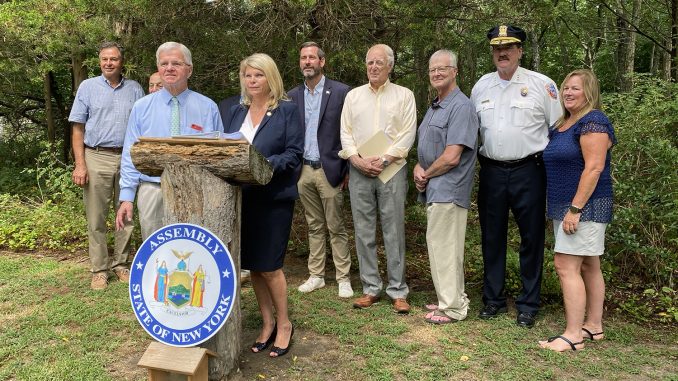
A deer management pilot program proposed by state officials would grant the Department of Environmental Conservation greater ability to monitor the growing problem in Southold Town and adjust responses as needed more quickly and effectively.
Assemblywoman Jodi Giglio (R-Riverhead) and other local officials discussed the effort to control the deer population and problems deer overpopulation causes at a press conference Friday in Cutchogue.
The event at Downs Farm Preserve also featured Assemblyman Fred Thiele (D-Sag Harbor), who with Ms. Giglio co-sponsored legislation that would grant the DEC authority to establish the deer management pilot program in Southold Town. State Senator Anthony Palumbo (R-New Suffolk) is a sponsor of the bill in the Senate.
“Sometimes tests (for Lyme disease) may not turn up positive for several weeks after initial infection,” Ms. Giglio said. “This only complicates the task of accurately diagnosing and treating it before it gets worse, especially for our senior population.”
Lyme disease symptoms often can be misdiagnosed as arthritis, she said.
Suffolk County statistics on tick-born diseases from 2014 to 2020 show that Lyme disease accounts for about 534 cases, while babesiosis was second with 153 cases and ehrlichiosis third with 51 cases.
“Virtually every family on the East End has had somebody with some form of tick borne disease,” Mr. Thiele said. He said he had two tick-borne diseases himself.
County Legislator Al Krupski (D-Cutchogue) said when he was growing up in Peconic it was exciting to see a deer because it was rare. Now, he said, the deer population is out of balance.
He said people often don’t realize that when a deer is struck by a car, it may not die immediately and will suffer for a long time.
Councilman Greg Doroski said while Southold Town has a “world-class deer management program,” more still needs to be done to control deer population.
“This is a public heath, public safety, environmental and economic crisis,” he said. “The strategies outlined by the state experts at the DEC will give us the necessary tools we need to get the herd to a safe and sustainable level.”
John Rasweiler of the North Fork Deer Alliance said deer on Long Island have no natural predators.
“The East End had unique challenges that require unique solutions,” said Supervisor Scott Russell. “This pilot project, I believe, will be successful and will serve as a template for other programs.”

